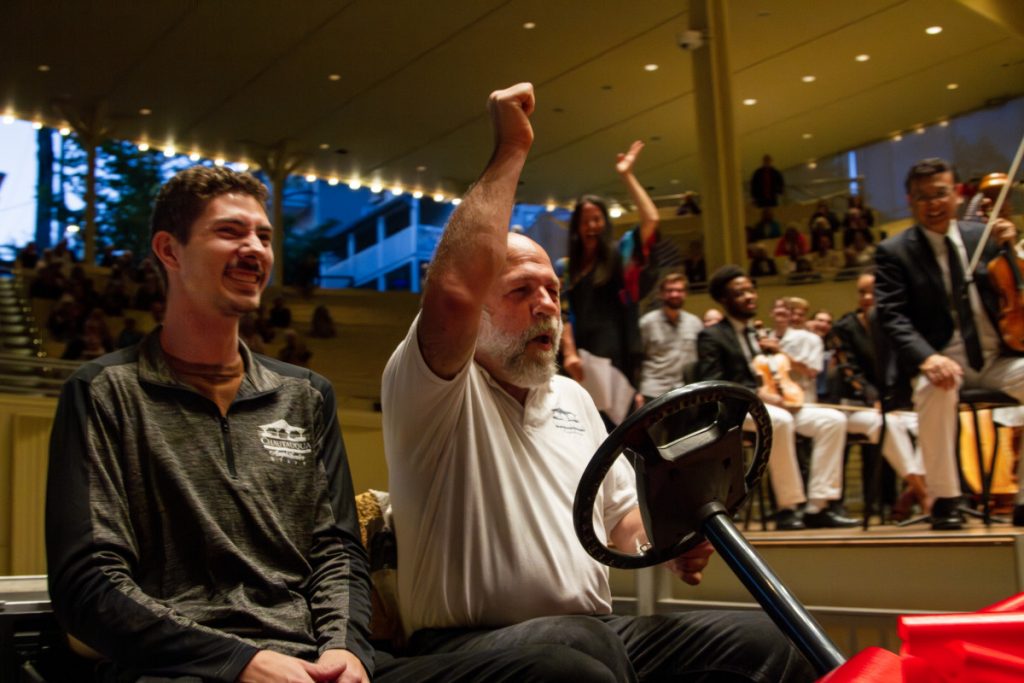
As the Chautauqua Symphony Orchestra members took the stage and tuned up their instruments, Deborah Sunya Moore, senior vice president and chief program officer, addressed the audience last Saturday, but for more than the usual announcements.
“The Amphitheater has been called the heartbeat of Chautauqua, where we gather very publicly for performances and presentations,” she said to the gathered audience. “As the Amphitheater is the heartbeat for Chautauqua, so our Amp manager is the heartbeat of our Amphitheater. His name is Keith Schmitt and tonight we are celebrating his retirement at the end of the summer, this summer being his 40th season at Chautauqua.”
With the Amp crew gathered along the railing on one side, Schmitt entered to cheers and applause.
Moore and the crew presented him not only with a framed collage of photos to celebrate his retirement, but also another surprise: the keys to “The Batmobile” — his original, refurbished golf cart “raised from the dead.”
Schmitt leaned back with laughter then pumped his fists in the air as electrician Jeremy Warsitz drove the golf cart out onto the floor of the Amp.
Without addressing the crowd, Schmitt raised the key in the air in triumph, then went down the stairs and hopped in the driver’s seat.
“It’s not his final exit, but it’s a dramatic one,” Moore said to the crowd, before one of the Amp crew shouted, “12 miles per hour!” as Schmitt and Warsitz sped away across the floor and out the portal on the other side.
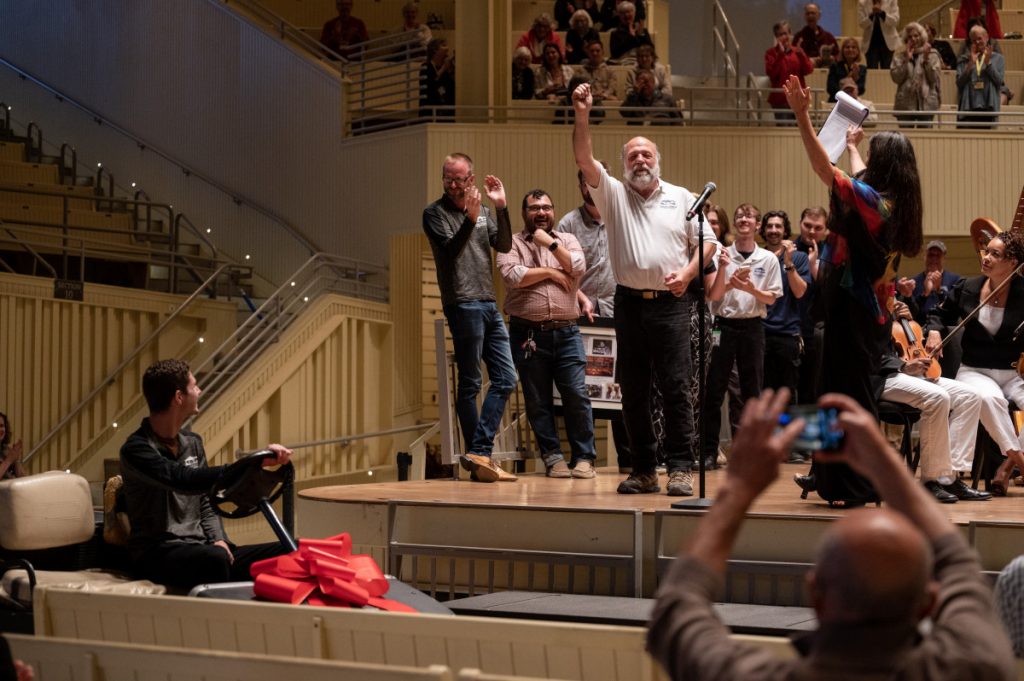
Schmitt, who grew up in northern Virginia, remembers listening to short-wave radio and learning how to solder electronics when he was young.
He said his eighth-grade shop class is what first got him hooked on theater and production design.
“They came in looking for help building scenery for a show, and I thought I’d like to hang out with the older guys, so I got started — and that was it from there,” he said.
After earning a theater degree from George Washington University, he got his first experience working at Wolf Trap National Park and with the Washington Ballet.
One of his coworkers at Wolf Trap, Mary Theresa “MT” Mennino, left to take a position at Chautauqua — the first he had ever heard of such a place.
Eager to start his career, Schmitt kept his eye out and applied when an opening for the Amp manager came up.
During his first-ever visit to the grounds and tour of the Amp one March day, the weather was more intimidating than it would be during the summer season.
“We literally had to climb over the … eight-foot piles of snow to get in to look at it,” Schmitt said. “It was actually a little scary … (I thought) ‘How does this work?’ ”
Things went well, though, and the interview turned into an orientation, and he got the job.
He called his first summer season, in 1984, “a blur” but he has never forgotten his very first show that year: Tony Bennett and the Buddy Rich Band.
Preparing for the show went smoothly enough, even though Schmitt had heard rumors that Rich could be difficult to work with. Then, the day of the show came, and Schmitt said the bandleader could tell he was nervous.
“When I called places to start the show, he was just sitting on a stool and looked at me, crossed his arms and said, ‘I’m not going anywhere,’ ” Schmitt said. “The rest of the band was like, ‘There he goes …,’ then, finally, he started laughing and went up on stage.”
He admitted that took him by surprise, but the rest of that first show — the contract for which he recently unearthed from his personal files, including pages full of lighting cues and notes — went smoothly after that.
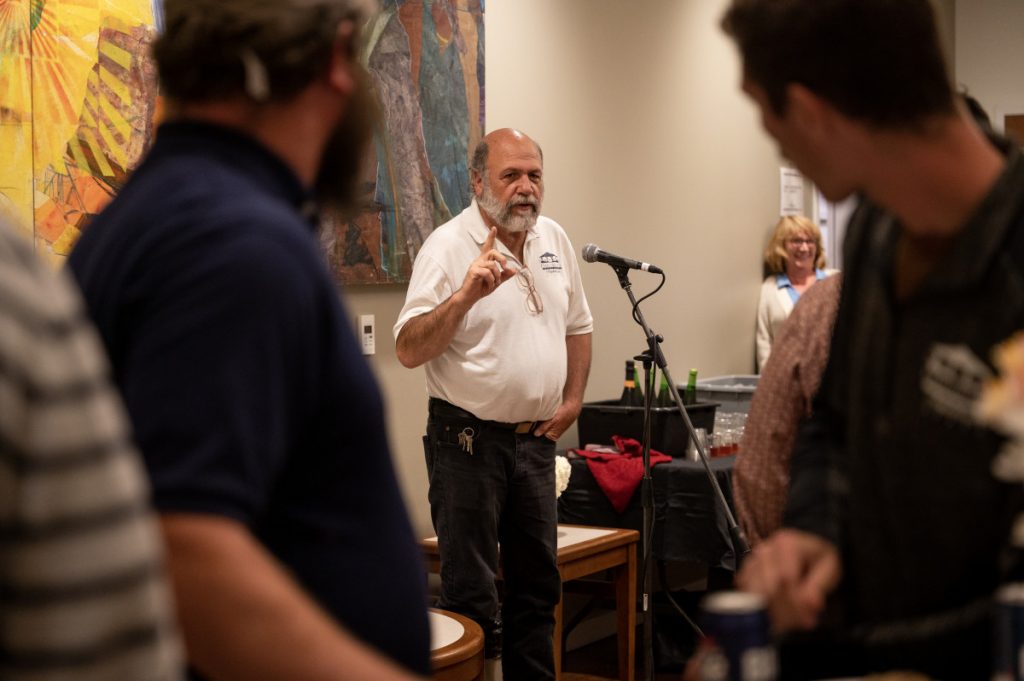
Now, four decades later, Schmitt has collected plenty of confidence in his role.
“The simple way to describe it is: the folks over in the Colonnade book the show, and then I make sure it gets on stage,” Schmitt said.
But that often encompasses any number of tasks, including hiring sound and lighting technicians, as well as the sweepers who are up early to make sure the Amp is clean and ready for each day’s worth of programming.
In the beginning, Schmitt also served as stage manager for the orchestra, as well as stage manager and lighting designer for the dance programs.
“The programs have gotten bigger and bigger, so they ended up hiring their own stage managers and lighting designers,” he said.
During each summer season, the Amp hosts 180 public events, including all the lectures, entertainment and worship services. That’s between two and three events per day, seven days per week for the nine-week season, not counting rehearsals and sound checks.
At an average theater, it would take a year “to do what we do basically in a week here,” Schmitt said.
Overseeing thousands of events means he has had to troubleshoot and even help put out actual fires — which happened in 1995 when a misplaced light fixture caused an evacuation during a CSO concert.
“It took from the time the house was open until 10 minutes into the show to slowly burn through the ceiling,” Schmitt said. “Somebody in the audience was like, ‘Oh look, there’s embers coming down from the ceiling.’ ”
The blaze left only minor damage, and no one was injured.
“We got the building empty in less than three minutes. It was pretty impressive,” Schmitt said.
When conversations about replacing the Amp started around 2007, Schmitt served as an integral partner.
“The old building was like trying to play contact sports with your great-grandfather,” he said. “You can only move so fast and there’s only so many places you can move. And it was all by hand.”
Fast-forward to the brand-new $42 million building opened in 2017: screens used for audience visuals are on electric winches, the floors are level with fewer stairs, and there’s more storage, backstage and attic space, among other improvements.
In the “old Amp,” at one point, Schmitt found out a sound technician was feeding muffins to a skunk living under the wooden floor. Backstage, one of the dressing rooms was so small that a notch was cut out of the bathroom door so the toilet lid would close.
The orchestra library had no air conditioning and, since it shared space with performer hospitality, was frequently made even hotter by catering sternos. Even worse was hanging equipment during the hottest days of summer from the attic, home to plenty of bats and their guano.
“Now, it’s almost heaven,” Schmitt said. “It’s a huge difference.”
Even the 116-year-old Massey Memorial Organ and its 5,640 pipes have seen improvements during Schmitt’s tenure. He remembers back when the instrument was analog, requiring two metal hoses.
“Wherever you put the organ, you would have to drag this enormous flexible hose out,” Schmitt said.
About six to eight inches in diameter, one was for the compressed air needed for the pipe stops, and the other was for the individual wires for each pipe.
Since 1993 when it was digitized, the cable is only the diameter of a finger, making it much easier to maneuver.
The best part about working with the organ, Schmitt fondly recalls, was his relationship with the late Jared Jacobsen, who served as the organist and coordinator of worship and sacred music from 1996 until his death in 2019.
“He really loved the crew,” Schmitt said, and at the end of the summer, Jacobsen would give the crew a “tip.” It grew each year for several years until it funded an annual crew dinner, which they continue to carry on in his memory.
After years of joking about it before Jacobsen’s weekly Wednesday recitals, in 2016, Jacobsen finally played Queen’s “Bohemian Rhapsody” in honor of Schmitt’s birthday.
“He did it cold because he didn’t want to give it away by rehearsing, since he knew I would hear him,” Schmitt said.
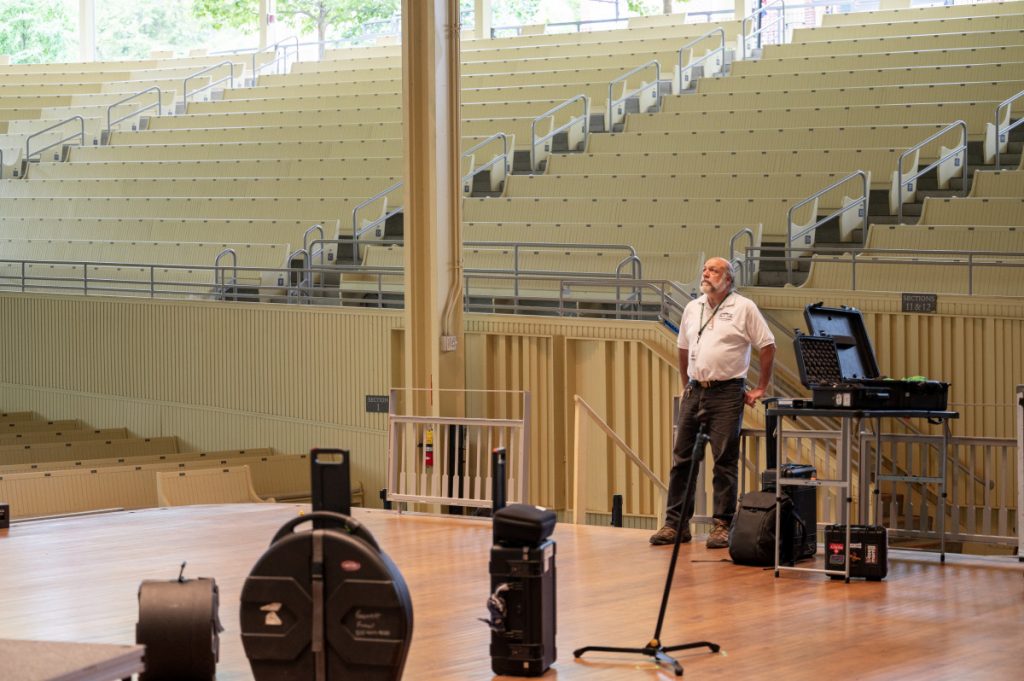
Big productions, such as Carmina Burana and a visit from the more than 300-member Mormon Tabernacle Choir, stand out in his memory.
Another time, inspired by a movie-themed pops concert, Marty Merkley, then-vice president and director of programming who retired in 2015, flew down to the stage from the attic as Spiderman.
“He even had Silly String up his sleeves,” Schmitt said. “Everybody who helped lower him in got a turn to fly in, so I actually got to go too.”
In 2003, Merkley expressed his gratitude to Schmitt and the Amp crew in the Daily. “Chautauqua and I owe Keith a great deal of appreciation and admiration for his behind-the-scenes work to make every event in this building happen, happen on time, and to keep all of us safe, secure and entertained,” Merkley said.
Similar admiration can be found farther back in the Daily’s pages, including several notes from Institution President Daniel Bratton over the years.
“Keith Schmitt and the Amp crew had another stellar evening performance,” he wrote after Carmina Burana in 1992. “When you offer your applause after evening performances, remember a group standing backstage whose evening is just beginning.”
The Amp crew is almost always on board with new ideas.
“The reality is we’re on a cruise together,” Schmitt said. “You’re spending a hitch and we’re not stopping for nine weeks, we’re not coming back.”
Despite his one-time nickname, “The Bear” — complemented by a “Danger: Bear Area” sign he got in Alaska that hung on his office door for years — Schmitt said he usually leads with his sense of humor.
“It’s too much work to make it hard, so we try to have as much fun as we can,” he said. “Everybody does, then it ends up instead being more like a family by the time we’re done. We’re together too much not to be acting like one, and that’s just what Chautauqua is as a whole anyway; it’s no different than the rest of the grounds.”
For some Amp crew members, Schmitt knows three generations of their families on a first-name basis.
Last summer for the first time, he even had two generations of the same family on the crew: a member of the security staff had a son who worked as a sweeper.
“He genuinely cares about you and the industry,” said Amanda Wickmark, hospitality manager on the Amp crew. “It’s so nice to have someone that you can respect and will help you professionally, but also that you can carry on with and have a good friendship with. We can go visit each other when we’re not working and sit and have a beer or a coffee, but when stuff needs to get done, we get stuff done.”
If not over a beverage, Schmitt and friends are known to meet semi-regularly during the summer on the Athenaeum Hotel lawn for an “old man” cigar club.
“As much as he wants us to have fun, he has to whip us around to get the job done sometimes, but he is all about safety for everybody,” said Chris Dahlie, head of audio for the Amp.
Now an assistant professor at SUNY Fredonia, Dahlie said his first summer on the Amp crew was in 1999 after earning his bachelor’s degree in music recording from University of Southern California.
“I’ve learned from him more than any other single mentor in the live entertainment industry,” Dahlie said.
In Dahlie’s opinion, the Amp manager faces two big challenges. First, navigating the logistics of getting big trucks, trailers and buses carrying stage equipment and performers through the narrow, pedestrian-heavy streets of Chautauqua.
But after 40 years, Schmitt knows how to direct them around, such as the kids on bikes racing to Club just before 9 a.m., with patience and systematic efficiency.
“Everyone is inspired by that work ethic all the time,” Dahlie said. “He just kept coming up with more and more logistical solutions.”
The second challenge is staffing, because the crew is seasonal and often made up of teenagers or college-aged young people.
“Keith has characterized himself in his later years here as basically a teacher and educator,” Dahlie said. “You’ve got to have patience with people because you’re basically reinventing the wheel every year.”
Mike Smith, who grew up in Lakewood, New York, remembered his summers as a teenager working on the Amp crew where some of that work ethic was instilled in him.
“It was a motley crew of individuals that we had, but it was always good workers or good problem-solvers,” he said. “He has a really good knack for balancing people who were devoted, hard-working and problem solvers and people that were interesting and fun to be around for a summer.”
The quirks of the “old Amp” meant constant vigilance for things like trip hazards and aesthetics, Smith said.
“Keith had a real knack for pushing accountability,” he said. “I felt empowered when I was the crew chief that every minute detail was my responsibility, but also empowered to do things about it along the way.”
Smith, who now lives in Seattle, said even in his work as an investment specialist with JP Morgan Chase & Co., he maintains focus on client experience because of his mentoring from Schmitt.
For example, Smith remembered Schmitt would assign tasks just challenging enough for each person’s skill level.
“He’d let you fumble a little bit and problem-solve it yourself,” Smith said.
Andrew Williamson, who worked his way up from sweeper to Amp crew chief as a teenager, said Schmitt has honed the ability to nurture enthusiasm from the crew members.
“He shows his support and lends his support where it’s needed,” Williamson said. “He gives everybody an equal chance … he was certainly very supportive of finding ways for me to grow and do things.”
Williamson, who went on to earn a theater degree from the College of Wooster, has worked in concert production for the last 24 years.
In 2001, Williamson returned to the Amp as lighting director on tour with country singer Trisha Yearwood. He is currently on tour as a lighting technician with the Jonas Brothers.
“In the production world, that’s a big deal to have someone who will try anything and everything to make something work,” Williamson said.
Especially important in a place that values camaraderie and community such as Chautauqua, Schmitt exemplifies those values as a manager and a colleague, Williamson said.
“It really does show a commitment to his craft and to his job and I think that’s why people enjoy coming back summer after summer,” Williamson said.
Williamson remembered when the Amp crew took out a quarter-page ad in the Daily on Aug. 14, 1991: “If you see Keith Schmitt today, wish him a happy birthday! And ask him where all his hair has gone to!”
Schmitt can still remember hearing people yell out to him as he confusedly walked from his then-parking place behind Norton Hall, but he didn’t understand why until Bratton opened up the paper and showed him.
“That’s family,” Schmitt said.
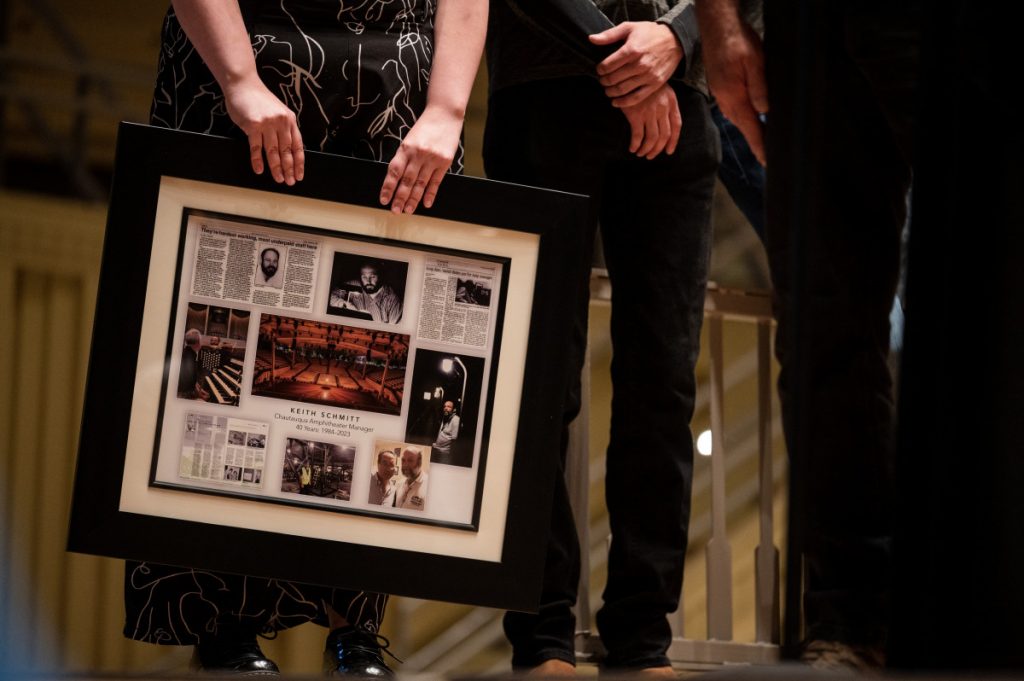
Once he officially retires, Schmitt said he doesn’t plan to go far. He wants to continue to be a steward of the Amp one way or another — an Amp manager emeritus, of sorts — to lead an interpretive program, possibly teaching a Special Studies class or giving tours, just as he’s done several times over the years, when he would take Clubbers on “backstage tours.”
“I probably took hundreds of kids up into the attic to show them how everything worked up there,” Schmitt said, “So I’d like to do something like that.”
As for his successor, he said the search has begun, with some in-house potential because of candidates’ familiarity and leadership.
“There are a couple of folks who have expressed some interest and there are folks that I would be really comfortable with making the transition,” he said.
In his off time, he plans to continue to travel. Having already visited all 50 states and more than 20 countries, he’s working his way through U.S. territories, with American Samoa next on the list.
He said a friend referred to retiring in terms he liked best.
“I’m letting my life’s GPS recalculate,” Schmitt said. “There’s lots of road left to travel.”




